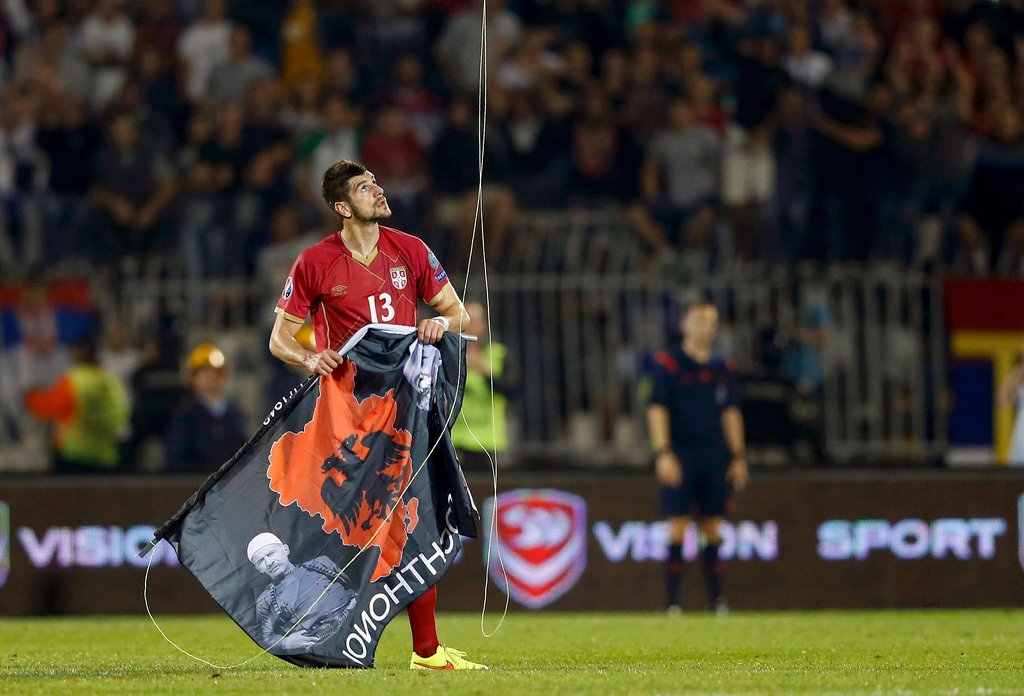After investing thousands of dollars and hundreds of hours meticulously planning for his moment, Ismail Morina realized he had made a rookie mistake.
It was 9:25 p.m. last Oct. 14, and Morina, a 33-year-old Albanian crane operator, was standing in one of the towers of the Church of the Holy Archangel Gabriel in Belgrade, the capital of Serbia. From there he could see into Partizan Stadium, where the soccer teams of Serbia and Albania were playing a tense qualification game for the 2016 European Championship. The match was scoreless as halftime approached.
In Morina’s hands was a remote control piloting a four-rotor drone, which at that moment was gliding across the rim of the stadium trailing a large nationalist flag bearing the double-headed black Albanian eagle. That flag was about to incite a riot, a diplomatic incident between two Balkan countries, and headlines across the world.
But there was one problem: Morina did not know which team was which.
“Serbia was wearing red and Albania white,” he said. “I was expecting it to be the other way around!”
Photo
Kosovar troops on Saturday with Ismail Morina, who piloted the drone that stopped the 2014 Albania-Serbia match. On any given day, dozens of people stop him to pose for pictures. Credit James Montague
As the drone hovered above the field, players, officials and fans looked to the sky in confusion. “I remember how quiet it went,” Morina recalled. “And then they saw the black eagle. …”
Morina’s problem was that he had flown his drone too close to a player in red, Serbia defender Stefan Mitrovic, and Mitrovic grabbed the flag and pulled the device to the ground. “I didn’t realize he wasn’t Albanian until it was too late,” Morina said.
As the Albanian and Serbian players fought for control of the flag, Serbian ultras and others invaded the field, and flares and other missiles rained down from the stands. The Albanian players ran down a tunnel, the match officials followed, and the game was abandoned.
Conspiracy theories were offered as to the identity of the pilot. Initially it was reported in Serbia that the culprit was the brother of Albania’s prime minister, Edi Rama. The Albanian dressing room was searched by Serbian police officers looking for evidence, but they came up empty-handed. In fact, at that moment, the drone’s real pilot was moving through the back streets of Belgrade, hiding from the police as he tried to escape the country.
The remote control was on the floor in the church tower.
The fallout was intense. The Serbian government considered the drone and the flag a provocation. “If someone from Serbia had unveiled a flag of Greater Serbia in Tirana or Pristina, it would already be on the agenda of the U.N. Security Council,” Serbia’s foreign minister, Ivica Dacic, told the newspaper Blic.
UEFA, European soccer’s governing body, initially ruled the game a forfeit by Albania, but the Court of Arbitration for Sport reversed that decision in July, awarding a 3-0 victory to Albania and docking Serbia 3 points for failing to control the crowd.
The sanctions ended any chance Serbia had of qualification for next year’s Euro 2016 tournament in France. But on Thursday, Albania and Serbia will meet again, in the central Albanian city of Elbasan. Nearly a year later, the drone incident — and Morina — remain the talk of the town.
The seeds for it were planted in 2010, he said. He had finished his shift working on a crane in Milan, where he had lived for the six years with his Italian wife and two children. When he went home and turned on his TV, he saw Italy playing Serbia in a 2012 European Championship qualification game. The match was abandoned after seven minutes because of crowd violence, but in the disturbances, two Serbian supporters wearing masks scaled a fence and used a flare to burn an Albanian flag.
“I couldn’t believe it,” Morina said. “If I had gone for a shower, I would probably have missed it. But I didn’t.”
UEFA frequently separates teams that have political issues. Armenia and Azerbaijan are separated during UEFA tournaments because of their unresolved conflict over Nagorno-Karabakh. Ukrainian and Russian club teams were separated during last season’s Europa League and Champions League draws over the conflict in East Ukraine. Yet when the draw for the Euro 2016 qualification campaign was made in February last year, Albania and Serbia were allowed to be placed in the same group because, a UEFA official said, they have not been directly at war. (Significant numbers of ethnic Albanians live throughout the Balkans, most significantly in Kosovo, where in 1999 Serbia tried to crush an uprising. Kosovo declared its independence in 2008, but Serbia does not recognize it.)
When Morina saw the draw for the 2016 tournament, and that the first Albania-Serbia game would be in Belgrade, he decided the setting would be “perfect.” After seeing a drone in a Milanese shop window, he bought several and began to practice flying them, destroying one in the process.
“I got used to it quickly because it was like when I drive my crane; I had a joystick,” he said.
A reconnaissance trip to Belgrade was wasted because he believed — incorrectly — that the game would take place at the home to Red Star Belgrade, known as Marakana stadium. When Morina realized his error, he used Google Maps to choose five or six new sites. In the end, he decided on the Church of the Holy Archangel Gabriel, which was across the street from Partizan Stadium.
“It was easy,” he said. “Quiet, with a park all around. There was no one to stop me.”
After his drone was pulled from the sky, Morina made his escape on foot, trying to get back to the car he had parked almost a mile away. When he saw two policemen, he said, he rolled under a parked car and waited for them to pass. Soon he was on the highway south, and a few hours later he had crossed into the safety of Kosovo.
“I still thought I had failed at this point,” he said. “Then I got a call from a friend in Italy. He told me, ‘Man, you’re famous.’ ”
Morina’s mission, he said, had been to send a message. The flag he attached to the drone bore the double-headed black Albanian eagle, a map of Greater Albania — a nationalistic concept that also includes territory in Macedonia, Greece and Serbia — and the date Albania won independence from the Ottomans in 1912. At the bottom was the word Autochthonous, an obscure English word that means indigenous, or native.
“I am a patriot, not a nationalist, and I chose it to say to the Serbs that it is the Albanians that are native to the Balkans,” he said last week, sitting in a cafe in the Albanian capital, Tirana. “That is not to say the Serbs can’t live here,” he added. “But they have to respect our flag.”
In Albania, the drone has made Ismail Morina a national hero. On any given day, dozens of people — students, war veterans, even the police — stop him to pose for pictures. His actions are still discussed on Albanian television regularly, although not always favorably. “One analyst on TV said I was both from ISIS, because the flag was black, and that I was paid by the Serbian secret service!” he said.
Thursday’s rematch could be a significant moment. Assured of at least a third-place playoff spot, Albania can move to the verge of qualifying for its first major international tournament by beating Serbia. But the Albanian soccer federation has told Morina not to come; the match has been deemed high risk by UEFA, meaning no Serbian supporters — aside from 70 students — will be allowed to attend.
But even after the game, life will not be the same again for Morina. He is now back in Albania permanently, having left Italy three days after the drone incident because, he said, “people knew where me and my family lived.”
He knows of the threats made against him online and has even heard tales that there is a reward for his capture. “I’m not worried about the Serbian state, but extremist groups,” he said.
He pulled out a gun that he bought recently. He says he keeps it with him, loaded, at all times. It is a Zastava pistol. Made in Serbia.
A few days later, Morina was flipping through his private messages on Facebook at a restaurant outside Tirana. There were a number of threats. One picture, sent from a Serbian who claimed to be a former member of the country’s special forces, displayed an arsenal of guns and knives. “Maybe I’ll send a picture of my Zastava,” Morina joked, clearly worried.
But in the early hours of Wednesday morning, Morina was arrested. The police reportedly seized the pistol and about 30 tickets to Thursday’s match. More important, they said Morina did not have a permit for the gun. It is unlikely that he will be allowed to watch the match in jail.
(The New York Times)














